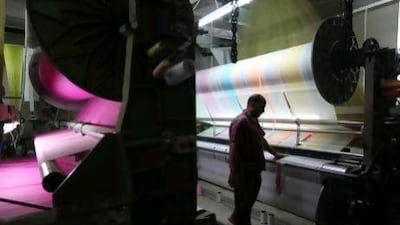CAIRO // Egypt's cotton, regarded as the best in the world and affectionately named "white gold", is one of the nation's prized exports.
Famed for its long and extra-long fibres that can be spun into fine yarns to weave luxury fabrics, Egyptian cotton is rivalled only by America's Pima version.
But a marked increase in the cost of farming the commodity, coupled with competition from cheaper threads from elsewhere and labour strikes in textile factories, has cut down to size the world-renowned luxury cotton producer.
Revenues from cotton exports are now dwarfed by money earned from the export of fruit and vegetables.
"In the 1970s, we used to grow cotton on 2 million feddans, now it has been reduced to 300,000 feddans," said Ali Hebeish, an Egyptian scientist specialising in textiles who has worked closely with the government on various cultivation projects. One feddan is equal to 4,200 square metres.
"The main problem is with the farmers as the cost of producing cotton is increasing and the government needs to take a share in this matter."
Although the government has tried to find ways to boost agricultural output with mega-projects aimed at reclaiming thousands of square kilometres of land from the desert, inconsistent policy has been a major hindrance.
This year, the government announced it would allocate 200 million Egyptian pounds (Dh120.89m) in subsidies to cotton farmers. But with simultaneous efforts to reduce subsidies and textile workers demanding higher wages, it is unclear how much difference this investment will make.
Now production of the country's superior cotton is steadily being overtaken by other countries in Africa, including lesser-known producers such as Burkina Faso and Mali, according to data from the US department of agriculture.
The Alexandria Cotton Exporters Association, Egypt's main cotton industry group, said last week the country shipped 90,327 tonnes of the fibre, valued at US$280 million (Dh1.02 billion), since the marketing year began in September.
But by about this time last year, exports had already exceeded $455 million in value.
The pattern of Chinese imports, which have come to dominate the market, have also played a role in declining demand for better-quality cotton.
Beijing's policy of buying and hoarding large amounts of cotton in state reserves will influence the market during this year's and next year's seasons, the head of the world's biggest cotton trader said last month, Reuters reported.
"Everything [in the cotton market] is dependent on the Chinese reserve policy," said Joe Nicosia, the president and chief executive of Allenberg Cotton Company.
Even Egypt's textile sector does not rely on the locally produced cotton but imports cheaper short- and medium-staple material to make low-cost garments.
This has meant the value of ready-made garments, such as denim and other items that use coarser fibre, has surpassed cotton exports.
That has been helped by the country's establishment of qualifying industrial zones in 2005, where products made in the zones are granted tariff-free access to US markets.
Following the end of the Egyptian revolution and the departure of then president Hosni Mubarak last year, the "cost of manpower" has become another factor in weakening Egyptian exports, says Mr Hebeish.
Workers at Egypt's largest cotton-spinning centre, Mahalla, for years have held a series of strikes protesting against low wages while the price of producing cotton increases. Those strikes have continued this year.

